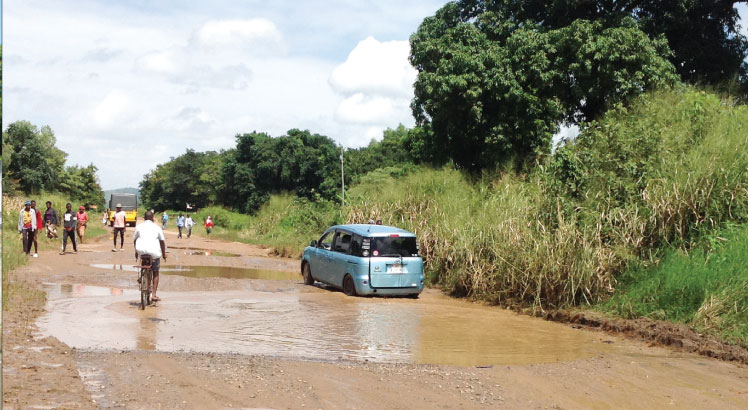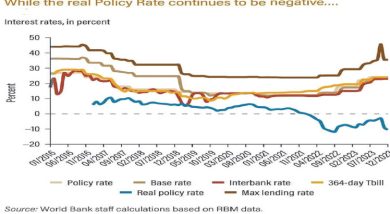Tragic disgrace on M5
I
magine a road trip within sights of your country’s largest freshwater lake, a 300-kilometre (km)picture-ready tourist attraction across three districts, including a top producer of the sweetest export, sugar!
This should be every traveller’s marvel, but it is a deadly adventure to forget for road users haunted by deepening potholes on M5.
So bumpy is the one-time most thrilling drive that vehicles are constantly seen zigzag past the neglected pits and ramming into yawning muddy pools where most emerge with costly damages.
Fixing the breakdowns could be costly, but some travellers lose their lives on narrow stretches where vehicles from opposite directions crush bumper-to-bumper as they cling to the midline in a desperate escape from shattered lanes and edges.
Since January, Nkhotakota Police Station has registered six accidents, two deaths and four injured travellers on the 115km neglected stretch of the Lakeshore Road.

Here, motorists required to stick to the left lane are forced to veer to the right as road users seething with anger curse authorities for preventable breakdowns and accidents.
The deathtrap is vivid between Salima Town and Dwangwa in Nkhotakota, where trucks hauling sugarcane and sugar from the country’s largest cane fields seldom give way to small vehicles.
The potholes turned into craters easily push motorists into fits of anger as they keep deepening and expanding with no quick fix in sight.
The shattered road brings to mind images of astronauts walking on the moon.
Why the road has been neglected is “baffling and annoying” to Chikaiko Patisoni of Phakwe Trading Centre in Nkhotakota.
“When you see a person driving in a straight line on the M5, that one is most likely drunk or high on something illegal if not suicidal,” he said, pointing at a saloon vehicle slamming into potholes in a losing battle to navigate the craters.
The risky road is a lifeline for Dwangwa sugarcane fields, where Illovo Sugar (Malawi) plc mills sugar for both local consumption and export.
It also opens tourism pathways to picturesque attractions along Lake Malawi and in Nkhotakota Wildlife Reserve.
Every day, thousands of travellers use the battered road at their own risk to get to these tourist attractions and other destinations.
Since 2016, the road has deteriorated and hospital records show dozens of lives have perished as the Roads Authority (RA) keeps spending big on minor rehabilitation works mired in false starts, intriguing tales of backhand dealings and suspenseful endings.
The false promises abounded in the run to the 2019 Tripartite Elections when government contracted Mota Engil to rehabilitate the road.
However, the contract was swiftly cancelled shortly after the ascendency of President Lazarus Chakwera and his Tonse Alliance regime through the court-sanctioned fresj presidential election held on June 23 2020.
A deserted campsite pitched by Mota Engil at Lozi in Nkhotakota lies in ruins. It testifies to the final assuring attempt to right the wrongs that have long haunted the lakeshore road.
Last December, the RA deployed two contractors to rehabilitate the 60km stretch from Benga in Salima to Dwangwa. However, the wait continues a year after Parliament authorised government to borrow K20 billion from the Opec Fund for International Development to finance the project.
Minister of Transport and Public Works Jacob Hara says government treats the life-threatening road as “an urgent matter”, accusing the previous administrations of neglecting it to the current state.
“We are going to fix the road and my team in the ministry is working with the contractor to fill up the potholes as we await the commencement of the works,” he said.
However, the minister could not put a timeline to the long-awaited, repeatedly promised engineering works.
But Nkhotakota district commissioner Ben Tonho hopes that works will start soon as an unnamed contractor is reportedly finalising preparatory activities.
He said: “the contractor is on the ground for rehabilitation of the Kaphathenga to Benga stretch.”
Francis Phiri, a motorist who regularly plies on the road, rues frequent repairs to his vehicle.
He laments: “Every month, I spend more than K50 000 in motor vehicle repairs caused by the potholes.
“I will soon be pushed out of business if the road remains unrepaired.”
Meanwhile, commuters between Salima and Nkhotakota have hiked fares to offset the high cost of frequent repairs. Passengers now pay K5 000 for a trip worth K2 000 just last year.





